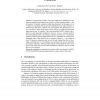Free Online Productivity Tools
i2Speak
i2Symbol
i2OCR
iTex2Img
iWeb2Print
iWeb2Shot
i2Type
iPdf2Split
iPdf2Merge
i2Bopomofo
i2Arabic
i2Style
i2Image
i2PDF
iLatex2Rtf
Sci2ools
120
click to vote
EMO
2005
Springer
2005
Springer
Multiobjective Optimization on a Budget of 250 Evaluations
Abstract. In engineering and other ‘real-world’ applications, multiobjective optimization problems must frequently be tackled on a tight evaluation budget — tens or hundreds of function evaluations, rather than thousands. In this paper, we investigate two algorithms that use advanced initialization and search strategies to operate better under these conditions. The first algorithm, Bin MSOPS, uses a binary search tree to divide up the decision space, and tries to sample from the largest empty regions near ‘fit’ solutions. The second algorithm, ParEGO, begins with solutions in a latin hypercube and updates a Gaussian processes surrogate model of the search landscape after every function evaluation, which it uses to estimate the solution of largest expected improvement. The two algorithms are tested using a benchmark suite of nine functions of two and three objectives — on a budget of only 250 function evaluations each, in total. Results indicate that the two algorithms sea...
| Added | 27 Jun 2010 |
| Updated | 27 Jun 2010 |
| Type | Conference |
| Year | 2005 |
| Where | EMO |
| Authors | Joshua D. Knowles, Evan J. Hughes |
Comments (0)

